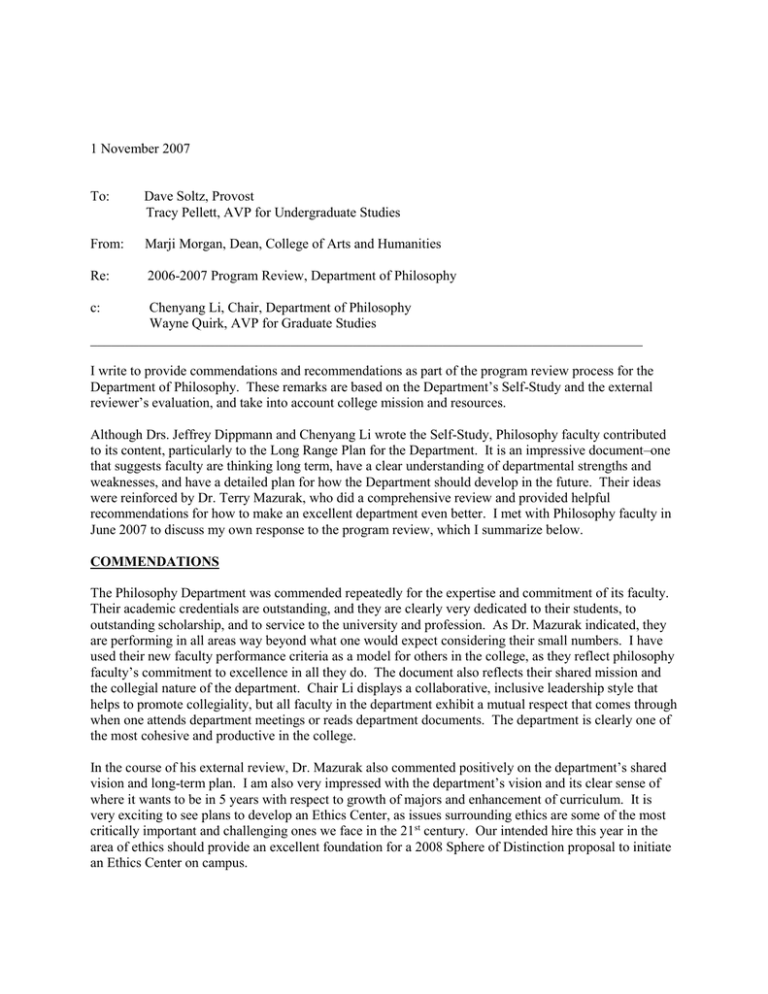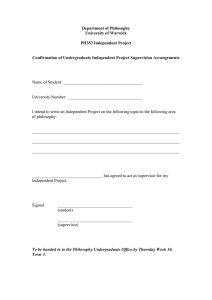Document 17560944
advertisement

1 November 2007 To: Dave Soltz, Provost Tracy Pellett, AVP for Undergraduate Studies From: Marji Morgan, Dean, College of Arts and Humanities Re: 2006-2007 Program Review, Department of Philosophy c: Chenyang Li, Chair, Department of Philosophy Wayne Quirk, AVP for Graduate Studies ________________________________________________________________________________ I write to provide commendations and recommendations as part of the program review process for the Department of Philosophy. These remarks are based on the Department’s Self-Study and the external reviewer’s evaluation, and take into account college mission and resources. Although Drs. Jeffrey Dippmann and Chenyang Li wrote the Self-Study, Philosophy faculty contributed to its content, particularly to the Long Range Plan for the Department. It is an impressive document–one that suggests faculty are thinking long term, have a clear understanding of departmental strengths and weaknesses, and have a detailed plan for how the Department should develop in the future. Their ideas were reinforced by Dr. Terry Mazurak, who did a comprehensive review and provided helpful recommendations for how to make an excellent department even better. I met with Philosophy faculty in June 2007 to discuss my own response to the program review, which I summarize below. COMMENDATIONS The Philosophy Department was commended repeatedly for the expertise and commitment of its faculty. Their academic credentials are outstanding, and they are clearly very dedicated to their students, to outstanding scholarship, and to service to the university and profession. As Dr. Mazurak indicated, they are performing in all areas way beyond what one would expect considering their small numbers. I have used their new faculty performance criteria as a model for others in the college, as they reflect philosophy faculty’s commitment to excellence in all they do. The document also reflects their shared mission and the collegial nature of the department. Chair Li displays a collaborative, inclusive leadership style that helps to promote collegiality, but all faculty in the department exhibit a mutual respect that comes through when one attends department meetings or reads department documents. The department is clearly one of the most cohesive and productive in the college. In the course of his external review, Dr. Mazurak also commented positively on the department’s shared vision and long-term plan. I am also very impressed with the department’s vision and its clear sense of where it wants to be in 5 years with respect to growth of majors and enhancement of curriculum. It is very exciting to see plans to develop an Ethics Center, as issues surrounding ethics are some of the most critically important and challenging ones we face in the 21st century. Our intended hire this year in the area of ethics should provide an excellent foundation for a 2008 Sphere of Distinction proposal to initiate an Ethics Center on campus. Page 2 The department also envisions expanding its current specialization in Religious Studies into a major. Given the growth of interest in this field at campuses across the country and the central role that religion plays in many national and international conflicts, I think this would be an excellent addition to our degree programs. The department is currently considering changing its name from the Department of Philosophy to the Department of Philosophy and Religious Studies, and I encourage faculty to propose this important change as soon as possible. Students are often unaware that we have even a specialization at CWU in religious studies, and the name change would make this offering more obvious to students. I also support the department’s proposal for an additional hire in the philosophy of religion, as such a hire is essential if we are to offer a major in religious studies, and it will also help to better link our philosophy and religious studies programs. I hope to be able to authorize a search for this hire in fall 2008. RECOMMENDATIONS AND CONCERNS The external reviewer offered some specific recommendations at the end of his review, and also expressed some additional concerns during the course of the review. I will address here the three recommendations, and also some of the concerns embedded in the document. Formalize the curriculum assessment process - this is a high priority for all departments in the college this year. The Department of Philosophy has had mechanisms in place for doing program assessment, and now has a more formal plan in place that clearly ties its program assessment activities to student learning outcomes and department goals. The results of this assessment process will be reported each year to the Dean and AVP for Undergraduate Studies, and will be used in revising curriculum and making other improvements in the department’s degree programs. I have already met with the department to discuss its assessment plan, and can say that philosophy faculty are in a good position to collect data that they can report centrally and use to make improvements in their programs. Re-examine the MA in Individual Studies in Philosophy - I agree that the department needs to think carefully about this degree, and work closely with the AVP for Graduate Studies and the CAH Dean to ensure that this is a credible program for our students. If the program remains, it should be strictly for a very few place bound students who have no other access to graduate education in philosophy. I would encourage the department to do two additional things in relation to this degree: 1) develop an assessment plan as it has done for the undergraduate degree [this is a must for accreditation] and 2) consider whether there are some appropriate 500-level courses in other departments that students in this program could take, to ensure that they have the experience of a dedicated graduate class. Address faculty morale issues - I agree that this is a very important issue that all of us need to work on. I am pleased to see that we are making much more use now of the Labor-Management Council provided for in the CBA, and I believe this opportunity for continuing dialogue between the UFC and the Administration will help to address some of the reasons behind the morale issues. At the college level, I intend to try to provide more opportunities for communication between myself and faculty, so I can better understand and address morale issues. For example, I will start having “Coffee and Chat with the Dean” sessions at least once a quarter, to which all faculty will be invited for the purpose of speaking their minds on issues of importance to them. As I said above, I think the Department of Philosophy is already doing a good job of creating a warm and supportive atmosphere for all faculty. I think we can all improve mentoring for non tenure-track faculty, and I want to work with all CAH departments on this important issue. Page 3 Large class size - It is true that the Department of Philosophy has a large average class size compared to the rest of the college–39 versus 24 students. I understand that this was a deliberate choice of the department, as it tried to build FTE in general education. The philosophy faculty are now rethinking this decision as scholarship expectations at the university are becoming more formalized. A good time for making adjustments to class size may be provided by upcoming reforms in the entire general education program when all departments FTE production are likely to be altered. Meanwhile, I have encouraged philosophy faculty to continue using undergraduate mentors in their large classes and I have tried to provide some reassigned time for scholarship to probationary faculty. Resource allocation - Dr. Mazurak expressed concern over the use of summer revenues to fund goods and services items. This is the funding system for the entire university, and it seems to me a serious problem only if a department’s summer revenues are low or wildly fluctuating. Until this year, this system of funding has been very advantageous for the Department of Philosophy, as it has tended to generate considerable summer revenue on a regular basis. Having said that, I agree that increasing base G and S funding is important to stabilize funding for philosophy and all other departments. With that goal in mind, I allocated more than the average increase of new G and S money in 2005 to philosophy, as their allocation was low compared to other departments. This year, I allocated $1,000 of one-time G and S money to philosophy. If we get additional G and S monies in the future, I will be sure that philosophy’s base allocation is commensurate with other departments. PROCESS The reviewer provided little feedback on the review process itself, except to say that he received the SelfStudy in plenty of time and found faculty and administrators well prepared to talk with him about the department. I think the very well prepared self-study also gave him very useful material to work with during the review. My only suggestion would be for the university to encourage all departments undergoing review to have a retreat, and to provide some funds for this type of activity. It would ensure that all faculty participate in the self-study process, particularly in the thinking about future directions and goals. SUMMARY There is no question that the Department of Philosophy is composed of outstanding faculty who are dedicated to excellence in everything they do. There is a strong sense of community in the department, reflected by the high level of collegiality and the sense of shared mission and vision. As they move toward more formal implementation of a well thought out assessment plan, the caliber and needs of their students should be more transparent, making curriculum improvement an easier and more effective process. I look forward to working with philosophy faculty, staff and students in an effort to assist the department in carrying out its mission and in realizing its ambitious vision.


